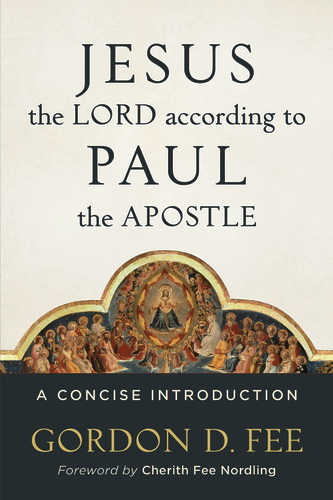
Fee - Jesus the Lord according to Paul the apostle
The phrase "salvation in Christ" may well serve as the basic summation of Paul’s central concerns regarding both Christian experience and Christian theology. Paul unpacks his christological soteriology in four ways: through a consistent grammar of salvation; an eschatological framework for salvation; an identification of the people of God made in Christ’s image as the goal of salvation; and an identification of the death and resurrection of Christ as the means of salvation.
Gordon D. Fee - Jesus the Lord according to Paul the apostle - A concise introduction
Baker Academic, Grand Rapids, MI, 2018
ISBN 978-1-4934-1425-3
Gordon D. Fee - Jesus the Lord according to Paul the apostle - A concise introduction - Contents
Endorsements
Foreword by Cherith Fee Nordling
Preface
Abbreviations
Part 1: The Savior
- 1. The Divine Savior
- 2. The Preexistent and Incarnate Savior
Part 2: The Second Adam
- 3. Paul and New Creation Theology
- 4. The Pauline Emphasis: A Truly Human Divine Savior
Part 3: The Jewish Messiah and Son of God
- 5. The Anticipation of Jesus in the Story of Israel
- 6. Jesus as the Son of David
- 7. Jesus as the Eternal Son of God
Part 4: The Jewish Messiah and Exalted Lord
- 8. Paul’s Use of the “Name” of the Lord
- 9. Paul’s Understanding of the Role of Jesus as Lord
- 10. Jesus the Lord: Sharer of Other Divine Prerogatives
Conclusion: Paul as a Proto-trinitarian
Glossary
Subject Index
Scripture Index
Gordon D. Fee - Jesus the Lord according to Paul the apostle - A concise introduction - The Divine Savior
One of the serious weaknesses of much traditional Protestant theology is its proclivity toward a doctrine of salvation (soteriology) devoid of a serious doctrine of the church (ecclesiology). That is, the tendency is to focus on salvation in an individualistic way that loses the “people of God” dimension of Paul’s perspective. This is due in large part to a presuppositional emphasis, especially in much Protestant theology, on discontinuity between the two covenants, with very little appreciation for the significant dimension of continuity. This presuppositional emphasis fails to recognize that such individualism is very much the product of modern Western civilization and that it scarcely, if at all, existed in the first century.
To be sure, the beginning point of discontinuity resides in the significant reality that entrance into the people of God under the new covenant happens individually, one by one, through faith in Christ Jesus and the enabling of the Spirit. As with all the New Testament documents, Paul’s letters in particular presuppose that they were written to first-generation believers who became so precisely in this way. Also of significance is that the churches to whom Paul is writing two decades into the Christian era were by then composed of more gentiles than Jews. How second-generation believers become members of the household of God is an area of huge debate and division among later Christians, in large part because these earliest believers could not have imagined that twenty centuries would follow them. The subsequent debate and division have happened in part because Paul, not to mention the rest of the New Testament, simply does not speak specifically to the matter of second-generation believers. Nonetheless, to embrace the “one at a time” reality to the neglect of the equally important “people of God” dimension of Christ’s saving work is surely to miss the Apostle by a great margin.
In this matter Paul is the product of two realities: his own personal history in the Jewish community and his divine appointment to be an apostle to the gentiles (Rom. 1:5; cf. Acts 9:15). Together these led him to presuppose that the goal of God’s saving work in Christ is to create an end-time people for God’s name out of Jews and gentiles together. Paul’s passion for such a people finds expression especially in his letters to the believers in Galatia and Rome. It is a primary driving concern in Ephesians as well, where the emphasis is more clearly on the church as a community of believers rather than on the salvation of individual believers as such. Indeed, in Ephesians the issue is not on justification by faith at all. The emphasis there is rather singularly on Jew and gentile together being re-created into one people of God, predicated on the crucifixion and resurrection of Christ and realized by faith and the indwelling of the Spirit.





Комментарии (2 комментария)
Важные произведения по паулинистике одного из мэтров современной библеистики - Гордона Фи! Есть надежда, что будет перевод для клуба!
Прекрасная новость о надежде на перевод!)